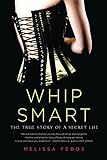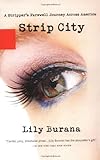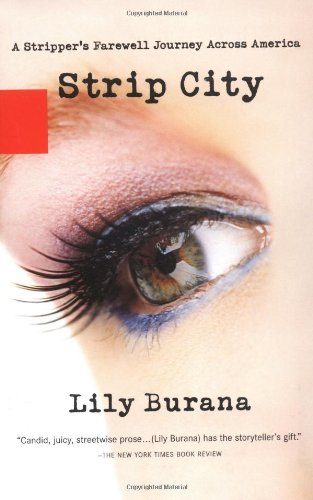
1.
It was 2010, six months after returning to Portland, Ore., from a stint of working as a stripper on the Pacific island of Guam. My car radio was tuned to NPR on my drive home from a boring office job. “This is Fresh Air. I’m Terry Gross,” the familiar voice sounded from the speakers quietly as I turned out of the parking lot. I listened passively, as I always did, while stuck in traffic at this time of day. My apartment was only a two-minute drive — extended to 10 minutes in traffic. “I’ve always wondered who responds to ads like this one,” Terri Gross continued, “which was in the back of the Village Voice: Attractive, young woman wanted for nurse role-play and domination. No experience necessary, good money, no sex. Well, my guest actually answered that ad and spent four years as a professional dominatrix in midtown Manhattan. And now, she’s written a memoir about it called Whip Smart.” I turned up the radio and wished for the traffic to worsen, to be stuck in my beat up silver Kia for the duration of the interview. I wanted to know everything, but not just because the guest had been a dominatrix, but because she wrote about it. I couldn’t imagine writing about my experience as a stripper, but especially my experience working in Guam, despite the fact that my plan was to major in creative writing. I’d write about lots of things, I’d thought. Just not that. I wanted to know about the kind of person that would write about it and then go on NPR. Then Terri Gross said, “It may be the first dominatrix memoir that mentions growing up listening to NPR.” The author was Melissa Febos. I was hooked.
 I got home even faster than I anticipated. I sat in my car, turned off the windshield wipers and watched the rain pitter-patter before me. I listened for the next half hour, without moving, close to crying but not exactly sure why. At the close of the interview Gross questioned Febos about whether her academic and career prospects might be damaged by her publishing Whip Smart. Not only had she been a dominatrix, but she was also a recovering heroin addict. I leaned into the radio, my own potential future breathing down my neck — I’d long been terrified that my five year career as a stripper might hold me back. It was the primary reason I felt I couldn’t write about it. “I have no idea if they’re going to interfere, but there’s nothing I can do about that. I’m sure that there are certain universities that would object to hiring me because of those experiences, but that doesn’t affect my view of their value,” Febos answered. As I had so many other times in my life, I wished I could be that bold.
I got home even faster than I anticipated. I sat in my car, turned off the windshield wipers and watched the rain pitter-patter before me. I listened for the next half hour, without moving, close to crying but not exactly sure why. At the close of the interview Gross questioned Febos about whether her academic and career prospects might be damaged by her publishing Whip Smart. Not only had she been a dominatrix, but she was also a recovering heroin addict. I leaned into the radio, my own potential future breathing down my neck — I’d long been terrified that my five year career as a stripper might hold me back. It was the primary reason I felt I couldn’t write about it. “I have no idea if they’re going to interfere, but there’s nothing I can do about that. I’m sure that there are certain universities that would object to hiring me because of those experiences, but that doesn’t affect my view of their value,” Febos answered. As I had so many other times in my life, I wished I could be that bold.
During the interview, I learned that Febos attended The New School — a university I’d never heard of before. It was located in the West Village, not far from NYU. As soon as the interview ended I did two things: purchased Whip Smart and Googled The New School. I realized immediately that it was the university for me. Ten months later I started my studies there as my family scoffed that I’d never be able to survive in New York.
 I read Whip Smart in a single night. Febos wrote about sex work in a way I’d never read before. That in the beginning everything about it makes one feel powerful, but how that feeling erodes with time, never fading completely away. But eventually there is acceptance that there are disempowering as well as empowering aspects to the work. I read the memoir Strip City, too, in which Lily Burana defines this for exotic dancers as “stripper damage.” I love that characterization, but it still feels a little too simple, too boiled down. As the years go on, more than anything, dancing settles into a routine — just like any other job. It loses the intrigue, mystery, the newness and glittering of the taboo. Things that were once novel or shocking become dull and meaningless. There is a getting-through-the-day that takes over. Febos writes:
I read Whip Smart in a single night. Febos wrote about sex work in a way I’d never read before. That in the beginning everything about it makes one feel powerful, but how that feeling erodes with time, never fading completely away. But eventually there is acceptance that there are disempowering as well as empowering aspects to the work. I read the memoir Strip City, too, in which Lily Burana defines this for exotic dancers as “stripper damage.” I love that characterization, but it still feels a little too simple, too boiled down. As the years go on, more than anything, dancing settles into a routine — just like any other job. It loses the intrigue, mystery, the newness and glittering of the taboo. Things that were once novel or shocking become dull and meaningless. There is a getting-through-the-day that takes over. Febos writes:
When people asked me how the work affected me, my line was: “I don’t know yet; ask me in ten years.” When I thought about how long I would do it for, I assumed that there would come a day when I simply couldn’t anymore, when everything about it had become banal and sad and I was done.
I felt similarly about dancing, and yet the times I tried to force an ending didn’t work. I couldn’t find a straight job or a straight job didn’t pay enough or I’d have a good straight job for a few months and then get laid off because of the economy. At the time I heard Melissa Febos’s interview I’d claimed I’d retired. I had two part-time office jobs, a full time school schedule, but still picked up shifts at the club I’d grown to consider my “home club” in Portland. I needed to save for my move to New York City.
But it was an extreme way to live. Sometimes I was up for 48-hours at a time in order to manage it all. I kept stripping a secret at the time. It seemed necessary after living in Guam. I had discovered upon my return that everyone that loved me had been worried. I didn’t talk about it much. I was accused of doing things I hadn’t (mainly prostitution). No one knew exactly why I went nor would they listen nor was I fully willing to be honest anyway. When I started to dance again I insisted silently to myself it was just about the money, but the moment I stepped back in the club, the moment I slithered into my favorite piece of sheer pink lingerie, brushed black mascara onto my eyelashes, and slipped into my eight-inch platform shoes, I felt relieved. I felt home. I was addicted.
Febos, too, felt addicted to sex work. In some ways it was worse then her heroin habit because she couldn’t kick it, like she did the drugs. Febos turned to her sober roommates looking for advice when she wanted quit sex work, but wasn’t able to:
…when I went to my roommate and expressed my reluctance, she looked at me in disbelief.
“Yeah he sounds really annoying. But fifteen hundred dollars? Come on. I would do it if I could.” What she meant was if she had the opportunity. At this point, I was starting to know better…I could not imagine my roommate going through what I knew a session entailed.
For fifteen hundred dollars. For an hour’s work. It sounded amazing, when you don’t know what the work meant, or when you pretended not to.
In Whip Smart, it starts to feel like she loathes the dungeon and judges everyone around her for participating in it — even though she, herself, is part of that world. I often made fun of the desires of my strip club regulars, not considering the fact that I was participating in exactly what they wanted of me. During one session, Febos suddenly feels that she and her client were brought together by some unknowable force. That there must be something more to her being in those rooms with men hoping for humiliation and her pleasure in doling it out:
Who was this man? What did we have in common to have both ended up in this room? I teetered over his face, peering into it for a dizzy moment. In what direction had this man come from, and where was he going? It was a feeling too objective to be compassion, but I suddenly felt on equal footing with him. For a moment, we formed two halves of a perfectly balanced scale.
And then I looked down at his erection and realized that the feeling was probably not mutual.
Years after the publication of Whip Smart, Febos published an essay in the “Sex, Again” issue of Tin House titled “My Melissa.” In it she explores the ways her lovers rejected her identity as a person who worked as a dominatrix:
After he read the memoir I’d written, he said, I think of her as a different person. Not my Melissa. He preferred me shy. So I distanced myself from the woman I’d written about.
…He drew a line between the body I wrote about and the one he loved.
This is common. One man I dated found what I had done in my past disgusting. When money was particularly tight I told him I was considering going back, and he said he’d leave me and then refused to talk to me for the rest of the day. I wasn’t that girl anymore, he asserted. I was someone else. But I was. I was always the girl that stripped and so much more. Febos ends her essay:
There are not two of me. I am not four times removed from myself. There is Melissa. The one who still dims the lights before she undresses. The one who once put her foot inside a man’s asshole. The one who wrote that book, and the next one. The one who prefers making love to bodies that look like her own. Who was never allowed to love her own body.
What I mean is, the next lover who tells me it wasn’t me won’t be a lover I’ll keep. And if you want to know how it felt to spank someone, I will tell you how it feels to be asked such a question.
2.
“Kettle Holes,” another essay, was published in Granta six months before the release of Febos’s new collection of essays Abandon Me. “Kettle Holes” explores her attraction to the dungeon. The foundation, she discovered, was in her formative adolescent years when a boy she had known spit on her — later it became a fetish that she acted out in the dungeon.
What do you like? the men would ask. Spitting, I’d say. To even utter the word felt like the worst kind of cuss and I trained myself not to flinch or look away or offer a compensatory smile after I said it. In the dungeon’s dim rooms, I unlearned my instinct for apology.
Febos found the idea of spitting on someone without consent unthinkable, but for men who wanted it? Who asked for it? It was, in a way, a loophole. As a stripper, I never wanted to hurt the men I danced for, but like Febos, when they asked for torture, I delighted in complying. One man wanted me to smoother him with a pillow for hours, another had me crush his testicles with my eight-inch stiletto heel repeatedly. I glowed after both of these interactions, happier about the fact the interaction had happened, than the hundreds of dollars they’d paid. I insisted I wasn’t angry, that I actually loved men, and here again are parallels:
You must work out a lot of anger that way, they suggested. I never felt angry in my sessions, I told them. I often explained that the dominatrix’s most useful tool was a well-developed empathic sense. What I did not acknowledge to any curious stranger, or to myself, was that empathy and anger are not mutually exclusive.
After I’d quit dancing, I also came to believe that my attraction to stripping had much to do with my adolescence. I was sexually abused as a child. I developed early and was told many times, starting at the age of 12, that I oozed sex. That I was sex. That sex embodied me. Stripping was a way to control the thing people asserted I was, whether I wanted it or not, and then have the power to control it. I learned how to say no to men as a stripper. Before getting naked in front of groups of strangers, I hadn’t yet realized that my body was mine:
In the dungeon, my identity was distilled once again to its objective meaning. And those men, like all the men before them, prescribed my body’s uses. But this time, my job was to deny instead of acquiesce, to say no instead of yes. Maybe this was the best way to learn how to form those sounds in my own mouth.
3.
The essays in Abandon Me explore several of Febos’s important personal relationships: with her adopted sea captain father, the love affair with a woman named Amaia, her brother, and meeting her biological father — a member of the Wampanoag tribe. These pieces culminate in the 173-page title essay, “Abandon Me.” It is within this section that alongside her love affair with the married Amaia, Febos meets her birth father. Each relationship bounces off the other. The relationship with Amaia rips apart while the relationship with her biological father, painfully and slowly, stitches together. The essay opens: “Every story begins with an unraveling. This story starts with a kiss. Her mouth the soft nail on which my life snagged, and tore open.”
I devoured these pages. Curled up on my coral-colored couch, I sometimes looked up as if someone might catch me in the act of crawling into her mind and living there for a while. It felt like I was being folded into her prose. Six months before I started reading Abandon Me, I’d learned who my father was, and that he had passed away seven years prior. Even with the theme of abandonment so clear, I wasn’t expecting to find something so specifically relatable. I expected that of Whip Smart. Of “My Melissa.” Of “Kettle Holes.” And many of the elements leading up to the title essay I had grabbed onto, lived within, but here was where Febos tore me open and never let me go.
Abandon Me doesn’t have graphic, shocking scenes like Febos’s first, instead she goes further into the messy vulnerable, human parts of herself. In “All of Me” Febos writes of her propensity for secrets, she created a “secret world in drugs and desire.” She didn’t acknowledge her desire to be seen, but wrote and published Whip Smart anyway: “a story full of things I’d never spoken aloud to anyone.” She comes to terms with the fact she’d always wanted to be seen. “It’s a violent way to emerge, to tell a secret,” she goes on. Right now, I’m grappling with the possibility of exposing my own secrets. Seven years after I heard Febos’s NPR interview, I’m in the middle of revisions on my memoir about working as a stripper on the island of Guam. I wonder if I can muster the courage to put it into the world, still unsure that what I want is to be seen. But, I’m comforted that Febos found the courage to do so. It makes me feel understood. And in a small way, I’m emboldened by it.


